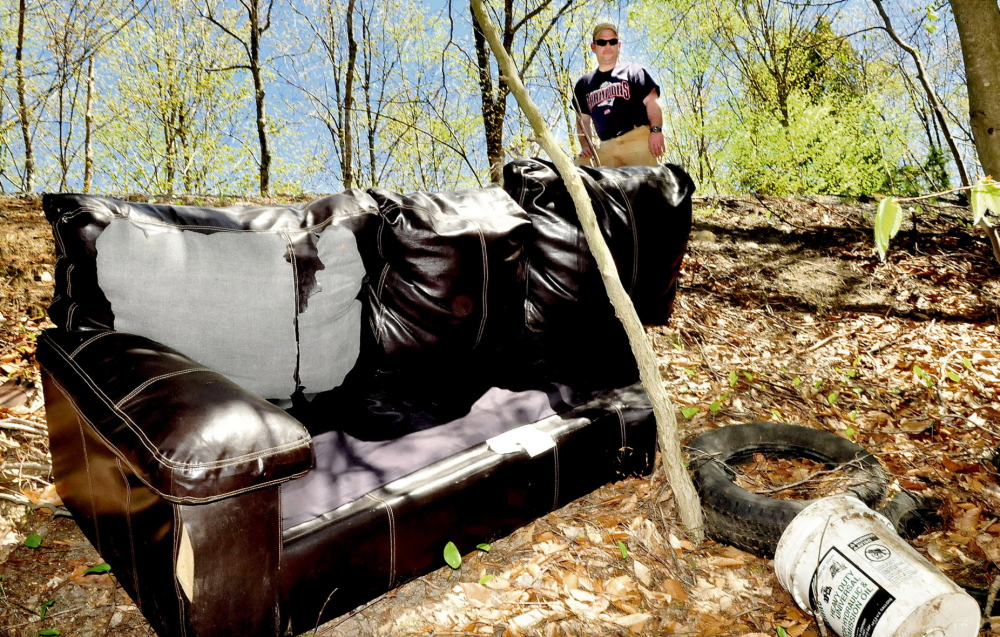An old couch thrown into a gully is more than a civil offense. It is an insult to those who appreciate the charm of the state’s back-road nature, and take seriously the idea of personal responsibility.
That’s why it’s disheartening to hear that the Maine Forest Rangers, the principal group charged with keeping the forests free of trash, out-of-order appliances and any number of other unwanted items, are dealing with more illegal dumping in areas off the beaten path.
More coordination is needed among the many parties interested in this issue. That, and continued vigilance from the public, will go a long way toward keeping the woods and roadsides clear.
IN THE DUMPS
Twenty years ago, one ranger told the newspaper last week, illegal dumping complaints amounted to only 2 percent or 3 percent of complaints. That number had risen to 9.5 percent by 2009, and last year dumping accounted for 13 percent of all calls.
Not only does that sully the landscape, but in many cases it is a threat to the good graces of private landowners who allow access to their property.
To show the appalling extent of the problem, volunteers in 2012 removed 190,000 pounds of trash and nearly 1,000 tires from 130 sites around Maine as part of Landowner Appreciation Cleanup Day. The next year, a smaller group removed 50,000 pounds of trash, 235 tires and 62 appliances from the woods.
Every community, it seems, has an area that becomes a dumping spot.
Decades of dumping near a Waterville cemetery built a 20-foot pile of brush and trash that eventually ignited, causing a 25-foot-high flame last month.
In Portland and other cities with significant residential turnover, moving day can turn into dumping day, with furniture left on the side of the road or in hidden alleys, creating a bed-bug danger.
PICKING UP
Maine has taken illegal dumping seriously.
The fines for illegal dumping are significant — the penalties, following the approval of a strict 2011 law, range from $100 for small amounts to as much as $25,000 for large amounts and repeat offenders.
And in addition to the land cleanup days, more and more communities are offering curbside trash pickup, bulky item collection programs, and household hazardous waste collection events.
Many people balk at the cost of disposing of some of these items, and say a free or lower-cost service would cut down on dumping.
But it costs a lot to have those items taken away because they cost a lot to ultimately dispose, and that cost is the responsibility of the owner.
Others argue that popular pay-as-you-throw trash programs, in which residents must buy special trash bags, leads to more illegal dumping. That argument appeared most recently in the debate of the trash and recycling program recently passed in Waterville.
Evidence, however, suggests otherwise, and dumping seems to be more of a case of carelessness than cost-savings.
MORE TO DO
Even still, the trash is piling up where it shouldn’t be. Catching people in the act is difficult, even though rangers often comb through trash for evidence.
The rangers aren’t alone — the Department of Transportation, local public works departments, conservation groups and recreation clubs — all work to clean up the woods and back roads, but a more integrated effort is needed to keep Maine clean.
A coordinated list of frequently used dump sites would be useful, as would increased monitoring. Some states use geographic information systems (GIS) to keep track of dump sites, and the federal Environmental Protection Agency offers grants to purchase cameras to watch over frequently abused sites.
It is a significant challenge — the state is more than 35,000 square miles of mostly forested land — but it needs to be tackled on a regular basis. Unfortunately, trash dumped at a site tends to draw more trash.
That’s why it’s important for most Mainers — the ones who wouldn’t dream of tossing a full garbage bag — to keep an eye out for trouble spots, and let the right people know.
Send questions/comments to the editors.



Success. Please wait for the page to reload. If the page does not reload within 5 seconds, please refresh the page.
Enter your email and password to access comments.
Hi, to comment on stories you must . This profile is in addition to your subscription and website login.
Already have a commenting profile? .
Invalid username/password.
Please check your email to confirm and complete your registration.
Only subscribers are eligible to post comments. Please subscribe or login first for digital access. Here’s why.
Use the form below to reset your password. When you've submitted your account email, we will send an email with a reset code.